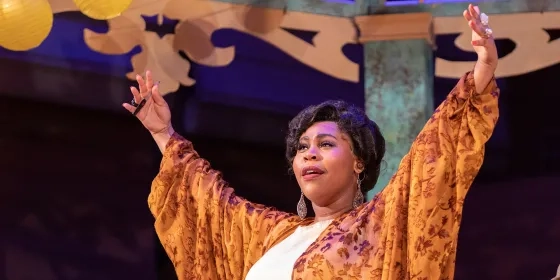SFCM Grad Pushes for Institutional Change in OPERA America Mentorship Program
Mayes is paired with Afton Battle, the General and Artistic Director of the Fort Worth Opera, for the 2022-2023 season.
By Alex Heigl
Malikha Mayes has a big voice—and big ideas.
The 2020 voice graduate, who studied with Rhoslyn Jones while at SFCM, was recently selected by OPERA America for its 2022-2023 Mentorship Program for Opera Leaders of Color, which, per the organization, "advances racial equity in the field by pairing BIPOC administrators with established leaders in the field who can support them in achieving their career goals." Mayes, who currently works as the Development Database and Membership Manager for the Dallas Opera, has been paired with the General and Artistic Director of the Fort Worth Opera, Afton Battle.
"I want to put equity and belonging at the forefront of my work, and so I wanted a mentor who was aligned in the same way," Mayes, a soprano, said, explaining that she had seen Battle speak at a webinar before she had ever applied to the program. "I gave Afton a general goal of mine for opera: I want to be a part of creating equitable, holistic change. So she's helping me figure out what I can do that will help me gain the skills to thrive in that way."
Mayes believes that the kind of institutional change she hopes to achieve can only come with some broad swings: "I want people to challenge the saying, 'We need to make a space at the table for everyone.' I think we should throw away the table and start fresh."
"People ask me about where my passion for equity and belonging and working in administration comes from, and one, I'm passionate about it because I'm Black," Mayes said. "But at SFCM, I remember for my winter term project in my second year, I put on a concert that showcased the different cultures at the Conservatory. I picked a few people I knew were singers that weren't white Americans and asked them to choose a song by a composer that represents their cultural identity and stage it however they want. And these were some of the best performances I'd heard from that group of people; it was a testament to singing things that represent you and how comfortable you can feel doing that. And that's where it started for me! I want people to feel like they can be themselves and identify with their culture in all spaces."
Watch Mayes sing "Non disperar...chi sa?" from Handel's Giulio Cesare.
To that end, Mayes thinks every member of the arts community—and particularly non-BIPOC individuals—has a responsibility to question the makeup of their company, the auditions they go on and the roles they take to do their part for a more equitable future.
"We have all these great talks about diversity, equity and inclusion, but does that work continue throughout your personal life? Does your work stop with those discussions?" Mayes added.
For the opera and classical world, Mayes allows that it can be tricky engaging in a canon largely constructed and reinforced by European men with an eye towards equity.
"I still love listening to Verdi! But I don't listen blindly anymore; I'm more aware of the systemic issues with the work. Like Madame Butterfly: I love Puccini, but for new productions of that, I'd be thinking of how the company would be addressing the stereotypes, the Orientalism of the work."
"So as a singer, if I'm learning an aria, I would consider what I'm doing to uphold the problematic images or overtones of a work—and how can I undo that? For Madame Butterfly, that could be consulting with the Asian Opera Alliance or having people who are from this part of the world tell these stories? It's about identifying, questioning and discovering how you can undo these systemic issues."
"And that is a biiiiiig question. But through my career, that's what I want to figure out and answer."
You could even say Mayes has found her forte.
Learn more about studying opera at SFCM.
